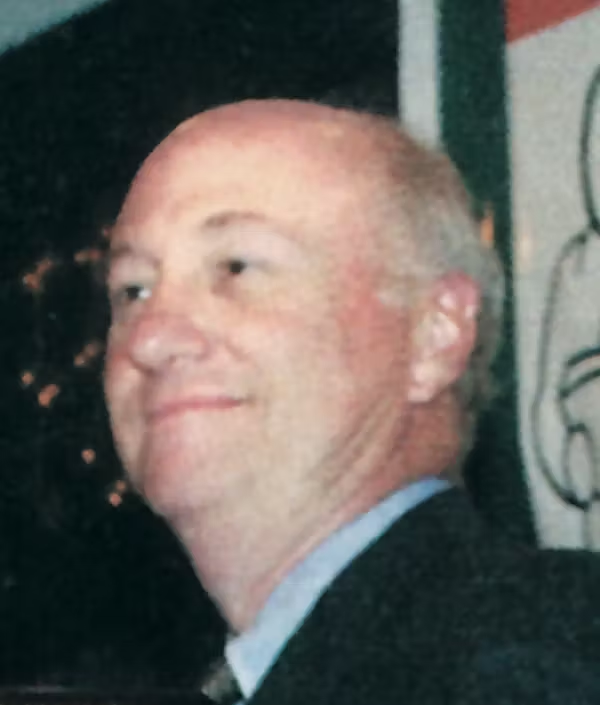
Burg, H. Peter
2004 - FirstEnergy Corp.
H. Peter Burg's shining example in both the professional and civic arenas leave big shoes to fill.
H. Peter Burg liked to laugh at himself.
The former chairman and CEO of Akron-based FirstEnergy Corp., who died in January after a battle with leukemia, was known among friends and associates for his quick wit and clever antics.
When Ohio Edison and Centerior Energy merged to create FirstEnergy in 1997, Burg, then president and COO of Ohio Edison, wore his old University of Akron basketball uniform to a staff meeting to stress the importance of teamwork.
"Quite frankly, he didn't look all that good in it anymore," laughs Anthony Alexander, who stepped in as acting CEO when Burg was diagnosed with cancer in December and was subsequently appointed CEO in January.
Burg's death at 57 left many in Northeast Ohio mourning the loss of a sincere and respectful man. Not only the leader of the fifth-largest public utility in the country, he was also a visible figurehead in the community through his involvement in organizations such as the Summit County Chapter of the American Red Cross, Cleveland Tomorrow, and Team NEO.
"Leadership requires that you take an active role, that you spend the time to make the area a better place," Alexander says. "He really did send an example to a lot of us to follow and it's not going to be easy."
A native son of Akron, Burg grew up in Goodyear Heights and attended St. Vincent High School. He excelled in both academics and athletics. A triple threat, Burg played basketball (his favorite), football, and baseball.
"I knew Pete through the sports pages," says Yank Heisler, chairman and CEO of KeyBank and a close friend of Burg's. "We used to read a lot about him in the paper."
"Pete made everyone on the field or on the court a better player," says Akron Children's Hospital CEO Bill Considine, who knew Burg since grade school. "His success was always on a team. Pete was a good team player and a good leader and he carried that into his business career."
Burg went on to study business at the University of Akron, and was a star point guard on the university's varsity basketball team.
Burg could punch out financials just as well as he could dribble a ball. "He was absolutely brilliant when it came to financial matters," Alexander says.
After graduating college in 1968, Burg began his career at Ohio Edison as a financial analyst trainee. He was only supposed to work there for the summer, before beginning a master's program at the University of Indiana. But at the last minute his housing arrangements fell through and his wife, Eileen, discovered she was pregnant with their first child. So he asked then-Chief Financial Officer Vic Owoc for a job.
He quickly moved up the ranks, serving as an associate financial analyst, economic analyst, and director of financial studies. He was elected treasurer in 1974, at age 28. Burg was appointed vice president in 1985, senior vice president four years later, and president and COO in 1996.
In 1999, Burg was named president and CEO of the recently formed FirstEnergy Corp.
He led the company into what began as a prosperous new millennium. FirstEnergy doubled its customer base from roughly 2.2 million to more than 4 million when it merged with $3.4 billion GPU Inc. of New Jersey in 2001. Burg was elected vice chairman and CEO after the merger and appointed chairman and CEO in May 2002. Unfortunately, not all of Burg's days at FirstEnergy's helm were bright. In early 2002, a grapefruit-size hole was found in the reactor head of the company's Davis-Besse nuclear power plant, near Toledo, when it was shut down for routine refueling, resulting in a domino effect of problems.
Then, in August 2003, 50 million people in eight states in the Midwest and Northeast and parts of Canada experienced one of the largest blackouts in history.
Though a final study issued in April pointed to broader industry issues, initial reviews by a US-Canadian commission investigating the outage pointedto events on FirstEnergy's system as the main cause.
But Burg never wavered.
"He understood adversity and he was able to handle it quite well," Alexander says.
"He was always calm under fire," Considine says. "Pete was a can-do guy and he made a difference. He had a lot of street smarts. He knew what the right questions were to ask and at the right time."
Burg also knew how to answer the difficult questions.
When the Davis-Besse problems erupted, Burg calmly and candidly answered stakeholders' concerns at the company's annual meeting, says Heisler, a FirstEnergy board member from 1998 to 2004.
"Not everybody could've reacted like Pete," Heisler says. "He stood tall and remained positive . ... People really rally around that."
'The last two years, as difficult as they were, he was at his finest," says Eileen, his wife of 36 years.
Burg was also persistent. Nowhere was this more evident than in his involvement in the community.
He wasn't just a placeholder on the boards of influential community organizations such as Akron Children's Hospital and the United Way of Summit County, he was a catalyst for change and improvement.
"Pete really valued this community," Considine says. "Because of his upbringing and his family, Pete felt responsible to give back to the community. He really enjoyed doing so."
Burg chaired the 2001 United Way of Summit County campaign, which raised $10.6 million.
During his three-year tenure as chairman of the Summit County Chapter of the American Red Cross, Burg helped raise $7.5 million to build a much-needed new Red Cross Service Center in Akron.
Burg used his skills as a businessman and negotiator to promote the region. Among the founders of Team NEO, Burg served as its first chairman and led the organization in its mission to promote Northeast Ohio and spur economic development.
Business associates say that Burg was a straightshooter. "With Pete, what you saw was what you got," says Dave Osterland, associate vice president for community relations at the University of Akron and former corporate speech writer for FirstEnergy.
His door was always open, literally, and there wasn't anyone he wouldn't help.
"He laid out a culture here based on ethics, integrity, and caring and concern for employees and the community," Alexander says. 'That culture will continue at FirstEnergy as a remembrance to him."
Burg was also a family man. Almost every night, he went home to share dinner with his wife, Eileen, and his three children, Amy, Bill, and Bobby. Then, if necessary, he'd go back to the office after dinner, almost always bringing one of his children along with him. In later years, it wasn't unusual to find one of his three granddaughters with him at the office on a Saturday.
He'd do anything for his kids, whether it was dressing up in costumes for family plays, taking his son to a rock concert, or hunting down a pair of season tickets to Michigan State University basketball games for his daughter, an MSU student who was heartbroken after standing in line for hours only to come home empty-handed.
"He was such a good sport and he loved to have a good time," Eileen says.
"We'll always miss him," Alexander Says.
Written by Sara Lepro

)